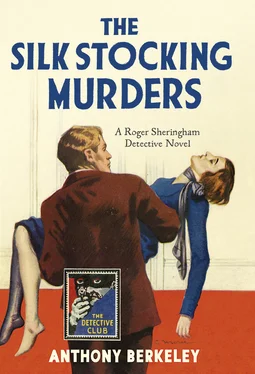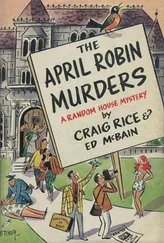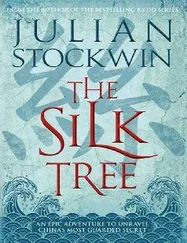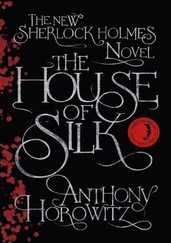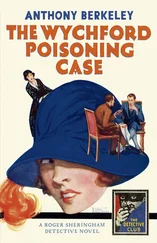But Berkeley eventually tired of playing games with detective stories and, though Sheringham would go on to appear in a few recently discovered wartime propaganda pieces, some shorter fiction and even a radio play, the last novel in which he appeared was published in 1934, less than ten years after his debut in The Layton Court Mystery . But Berkeley did not abandon crime fiction altogether. On the contrary, he decided to take crime fiction in what was then a radically new direction. For this new approach, Berkeley decided to use the name of one of his mother’s ancestors, a smuggler called Francis Iles. And, for three years, the real identity of Francis Iles was kept a secret. With Malice Aforethought , the first Iles novel, Berkeley broke the mould. At a stroke, he broadened the range—and respectability—of crime and detective fiction. Though the novel in part derives from an early short story and, while it could also be regarded as a variant of the inverted mystery popularised by Richard Austin Freeman’s Dr Thorndyke stories, Malice Aforethought is a much more complex proposition. For the first time Berkeley achieved what he had tried to do many times before: he focused on psychology. In Malice Aforethought it is the psychology of the murderer; and in the second Iles title, Before the Fact , it is the psychology of the victim. Characteristically, both are based on real-life crimes.
In all, three novels were published as by Francis Iles, with the third— As for the Woman (1939)—less successful than it might have been had it been presented as non-genre fiction, perhaps under yet another pseudonym. While a fourth ‘Francis Iles’ title was planned and even announced, Berkeley had published his last novel.
A few short stories appeared from time to time and, in the late 1950s, he completed two volumes of limericks, which were published under his own name. Berkeley also wrote some radio plays for the BBC, including one that, though credited to Anthony Berkeley, included two songs ‘by Anthony B. Cox’—and was introduced on its original broadcast by none other than Francis Iles!
In all, Anthony Berkeley published 24 books in a little over 14 years. He was also a prolific contributor to periodicals under his various names, authoring over 300 stories, sketches and articles; and he also reviewed crime fiction and other books up until shortly before his death in 1971.
To Agatha Christie, Berkeley was ‘Detection and crime at its wittiest—all his stories are amusing, intriguing and he is a master of the final twist, the surprise denouement.’ Dorothy L. Sayers also admired Berkeley and has Harriet Vane, in the Lord Peter Wimsey novel Have His Carcase (1932), describe the ‘twistiness’ of what she calls the Roger Sheringham method—‘You prove elaborately and in detail that A did the murder; then you give the story one final shake, twist it round a fresh corner, and find that the real murderer is B.’ The last word can be left to the mystery novelist Christianna Brand, a friend and near neighbour of Berkeley’s in London, who when reminiscing about the early years of the Detection Club commented: ‘Sometimes I have thought he was really the cleverest of all of us.’
TONY MEDAWAR
September 2016
CHAPTER I
A LETTER FOR MR SHERINGHAM
ROGER SHERINGHAM halted before the little box just inside the entrance of The Daily Courier’s enormous building behind Fleet Street. Its occupant, alert for unauthorised intruders endeavouring to slip past him, nodded kindly.
‘Only one for you this morning, sir,’ he said, and produced a letter.
With another nod, which he strove to make as condescending as the porter’s (and failed), Roger passed into the lift and was hoisted smoothly into the upper regions. The letter in his hand, he made his way through mazy, stone-floored passages into the dark little room set apart for his own use. Roger Sheringham, whose real business in life was that of a best-selling novelist, had stipulated when he consented to join The Daily Courier as criminological expert and purveyor of chattily-written articles on murder, upon a room of his own. He only used it twice a week, but he had carried his point. That is what comes of being a personal friend of an editor.
Bestowing his consciously dilapidated hat in a corner, he threw his newspaper on the desk and slit open the letter.
Roger always enjoyed this twice-weekly moment. In spite of his long acquaintance with them, ranging over nearly ten years, he was still able to experience a faint thrill on receiving letters from complete strangers. Praise of his work arriving out of the unknown delighted him; abuse filled him with combative joy. He always answered each one with individual care. It would have warmed the hearts of those of his correspondents who prefaced their letters with diffident apologies for addressing him (and nine out of ten of them did so), to see the welcome their efforts received. All authors are like this—and all authors are careful to tell their friends what a nuisance it is having to waste so much time in answering the letters of strangers, and how they wish people wouldn’t do it. All authors, in fact, are—But that is enough about authors.
It goes without saying that since he had joined The Daily Courier Roger’s weekly bag of strangers had increased very considerably. It was therefore not without a certain disappointment that he had received this solitary specimen from the porter’s hands this morning. A little resentful, he drew it from its envelope. As he read, his resentment disappeared. A little pucker appeared between his eyebrows. The letter was an unusual one, decidedly.
It ran as follows:
The Vicarage,
Little Mitcham, Dorset.
DEAR SIR,—You will, I hope, pardon my presumption in writing to you at all, but I trust that you will accept the excuse that my need is urgent. I have read your very interesting articles in The Daily Courier and, studying them between the lines, feel that you are a man who will not resent my present action, even though it may transfer a measure of responsibility to you which might seem irksome. I would have come up to London to see you in person, but that the expense of such a journey is, to one in my position, almost prohibitive.
Briefly, then, I am a widower, of eight years’ standing, with five daughters. The eldest, Anne, has taken upon her shoulders the duties of my dear wife, who died when Anne was sixteen; and she was, till ten months ago, ably seconded by the sister next to her in age, Janet. I need hardly explain to you that, on the stipend of a country parson, it has not been an easy task to feed, clothe and educate five growing girls. Janet, therefore, who, I may add, has always been considered the beauty of the family, decided ten months ago to seek her fortune elsewhere. We did our best to dissuade her, but she is a high-spirited girl and, having made up her mind, refused to alter it. She also pointed out that not only would there be one less mouth to feed, but, should she be able to obtain employment of even a moderately lucrative nature, she would be able to make a modest, but undoubtedly helpful, contribution towards the household expenses.
Janet did carry out her intention and left us, going, presumably, to London. I write ‘presumably’ because she refused most firmly to give us her address, saying that not until she was securely established in her new life, whatever that should be, would she allow us even to communicate with her, in case we might persuade her, in the event of her not meeting with initial success, to give up and come home again. She did however write to us occasionally herself, and the postmark was always London, though the postal district varied with almost every letter. From these letters we gathered that, though remaining confident and cheerful, she had not yet succeeded in obtaining a post of the kind she desired. She had, however, she told us, found employment sufficiently remunerative to allow her to keep herself in comparative comfort, though she never mentioned the precise nature of the work in which she was engaged.
Читать дальше
